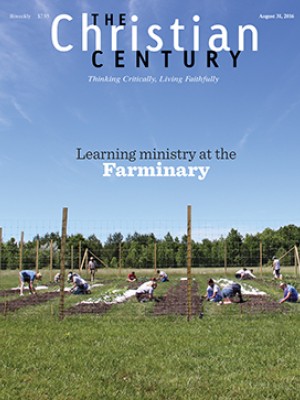September 11, 24th Sunday in Ordinary Time: Exodus 32:7-14; 1 Timothy 1:12-17; Luke 15:1-10
A remarkable feature of the Hebrew Bible is the freedom of the faithful to talk back to God. The psalmist can ask impatiently, “How long, O Lord?” Job can wish for his day in court, if only the divine judge and prosecutor would show up to hear him plead his case. Jeremiah can ask in no uncertain terms why he was seduced, abandoned, and made a laughing stock (20:7–12). Moses, with whom the Lord would speak face to face “as one speaks to a friend” (Exod. 33:11), can explode when the Lord’s chosen people refuse to eat their manna. And speaking of the people, Moses is quick to recall that they were entirely God’s brilliant idea, not his. He sputters and foams at the Almighty: “Did I conceive all this people? Did I give birth to them, that you should say to me, ‘Carry them in your bosom, as a nurse carries a sucking child,’ to the land that you promised on oath to their ancestors?” (Num. 11:12).
In each of these cases, the Lord’s beloved has a legitimate complaint. At other times the tables are turned and God is the one who is exasperated and aggrieved. Because of the great outcry against Sodom and Gomorrah, for instance, let the cities of the plain be swept away! And yet here comes Abraham—by his own admission only “dust and ashes”—who worries that in this cataclysm, the righteous might be disposed of along with the wicked. Whereupon the bargaining begins, until the “Judge of all the earth” is persuaded by Abraham to be merciful (Gen. 19).
Read our latest issue or browse back issues.
James calls Abraham a “friend of God” (2:23). In this week’s reading from Exodus, Moses presumes upon a similar divine friendship to offer God advice after the debacle of the golden calf. Tables are turned here: Moses is told that the errant Israelites are his responsibility, not God’s. All the Lord wants to do is wipe the slate clean—to let his wrath “burn hot against” the idolators, to destroy them and then start all over again with just Moses. With fire up his sleeve, let the “stiff-necked” truly be dust and ashes.
What is a mere mortal to say to this? Moses gives a reply in three stages, responding more like a judicious lawyer than keeper of a flock.
He begins by turning the Lord’s intention to destroy into a question: Why would you want to consume with wrath the same people “you brought out of the land of Egypt with great power and a mighty hand”? The Israelites are, after all, God’s own. Second, why give the Egyptians any reason to doubt the divine intention behind the Exodus? Why save the people from the Red Sea only to kill them in the mountains? Finally, Moses appeals to memory. God should look to the past, to the promises once made to Abraham, Isaac, and Jacob, to the inheritance of descendants and land offered to them—and with all of that, a future as God’s people.
There is, in this divine-human back and forth, a greatly appealing intimacy. It suggests the possibility of an exchange with God that is something like what one would have with a friend—that God is someone to be approached frankly, not courted, as John Donne writes, “with flattering speeches”; someone who can take us up when we are at our wit’s end and to whom we, in turn, can offer the voice of reason.
On the other hand, who actually has such a relationship with God? And who can really imagine talking the Almighty out of a bad idea or urging divine mercy instead of judgment? Is this a God anyone could worship? Besides, mustn’t there have been someone at Auschwitz or Bergen-Belsen who, like Moses in the wilderness, recalled to the Almighty the promises made to Abraham and his seed forever?
It is so much easier for Christians to think of God the way this week’s reading from 1 Timothy describes him, as “the King of the ages, immortal, invisible, the only God [to whom] be honor and glory forever and ever.” Or even more, as the shepherd Jesus speaks of in the Luke reading, someone who “goes after the one that is lost until he finds it.” These texts give us someone to worship and to emulate, not someone who is missing in action (“how long, O Lord, how long?”) or willing to throw in the towel on us.
Marcion, of course, would have thrown in the towel on the entire Hebrew Bible—the Torah of Jesus and Paul—as well as on much of our New Testament. In the interest of an immortal and invisible God he would have us lose the problematic possibility of a mysterious friend who both comes close and stays far away, who shares our human nature and transcends our human understanding. Such a friendship does not preclude asking questions of the Lord; rather, it provokes them, forever and ever.
Those who ask do not stop; they keep talking. And so the psalmist alternates praise with lament while waiting on the Lord. After a long-silent God speaks from the whirlwind at great length but without a hint of explanation, Job says, “I had heard of you by hearing of the ear, but now my eyes see you” (42:5). Jeremiah reaches such a point of frustration that he ponders vowing, “I will not mention him or speak anymore in his name”—yet he discovers that he cannot be silent. And Moses, at his death, blesses the Lord for the land promised to Abraham, Isaac, and Jacob, knowing that he will never enter the land he sees from the top of Mount Pisgah (Deut. 34:1–8).
To talk back means to keep talking. It’s what the friends of God do.





